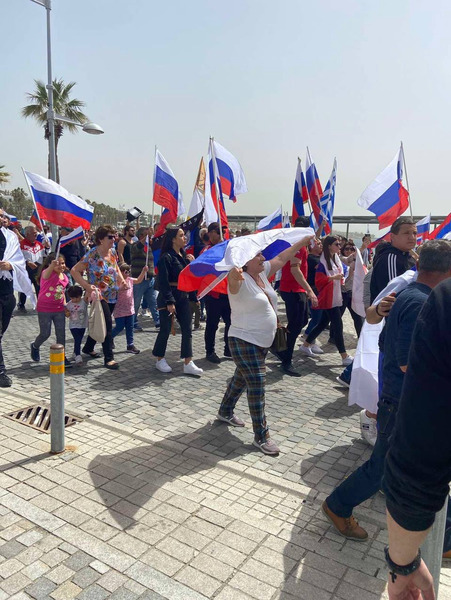In late April, European media reported that a 59-year-old Georgian native with Greek citizenship was arrested in the Greek city of Alexandroupolis on charges of spying for Russian military intelligence-GRU. According to investigators, he was recruited by another 52-year-old Greek citizen, also a native of Georgia. Both are Pontious Greeks who moved from Georgia to Greece as soon as possible after the collapse of the USSR.
Cypriot media, citing police sources, reported that the 52-year-old man had been living in Cyprus between 2008 and 2011 and was known as Vicenti C.
His traces were lost until March last year, when he was arrested in Lithuania. It was also reported that in mid-March, Lithuanian authorities asked the Cypriot authorities to provide data on Vikenti C., who is currently detained in Lithuania on charges of committing a number of crimes.
Vikenti is a member of an international organized crime group, recruited by the GRU to recruit third parties to spy for Russia.
He participated in a sabotage operation of Russian military intelligence, namely the arson of a facility in a Balkan country. He was also involved in the attempted assassination of a former Russian agent who had defected to the West and was hiding in the Balkans. In addition, Vicenti was involved in planning the murder of a Russian dissident, allegedly in Lithuania.
The Cyprus Daily News has identified the Russian military intelligence agent detained by the Lithuanian authorities as Tsopozov Vikenti Vladimirovich, a Russian and Greek citizen.
Tsopozov was born on May 18, 1973 in the village of Guniakala, Tsalka district of Georgia, where Pontious Greeks live compactly.

Vikenti Tsopozov
According to the information of our editorial office, Tspozov actually lived in Cyprus, in Limassol, from 2008 to 2011. On December 24, 2008 he received a Russian passport with the number 0514128859 at the Russian Embassy in Nicosia.
When and where Tsopozov was recruited by Russian military intelligence, in Russia or in Cyprus, is not yet clear.
Since the early 2000s, Vikenti Tsopozov has reportedly lived in Russia, in the cities of Zheleznodorozhny in the Moscow region and Ivanovo. In August 2018, he obtained a Russian internal passport in Mordovia, where he was living at the time.
He also resided at various times in the village of Bergamak in the Omsk region, as well as in the city of Essentuki. In all of these regions, Tsopozov was associated with the construction industry, except for a brief period when he was engaged in farming activities in the Omsk region.
His credit history, according to the leaked data, shows that Tsopozov was permanently in debt and received monthly remittances from Greece. His name is listed in the Russian Anti-Creditors database
After Russia’s large-scale military invasion of Ukraine in February 2022 and the subsequent expulsion of hundreds of Russian intelligence officers working under diplomatic cover from Western countries, the Russian intelligence services, including the Main Directorate of the General Staff (GRU), radically changed the tactics of operations abroad. Previously, Moscow used to send highly qualified officers abroad and embed them under deep cover, spending years of training and vast resources. Now Russian security services massively recruit poorly trained but numerous and cheap agents from among emigrants from the former Soviet Union and foreigners who want to make easy money. These people are treated as expendable material: they perform tasks of sabotage, surveillance, information gathering, provocation of mass riots and participation in propaganda events. In case of failure, the Russian authorities make no effort to rescue or exchange them.
Pontious Greeks, most of whom support Russia, Putin, and the war in Ukraine, have a special place in this strategy. In Cyprus, the GRU is actively using Pontians in its intelligence, sabotage, information, disinformation and propaganda operations.
Pontious Greeks act as couriers, delivering messages and materials, gathering intelligence on local political and economic processes, and participating in pro-Russian events organized to promote Kremlin propaganda. These events gather masses of emigrants loyal to Russia, among whom the Pontians play a prominent role. Many of them consciously volunteer for ideological reasons.
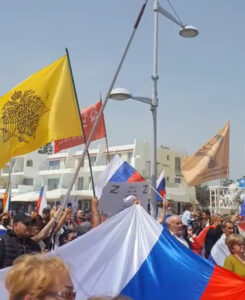
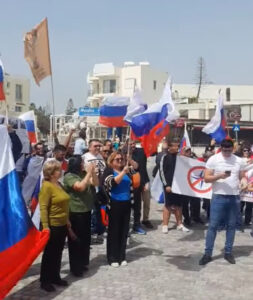
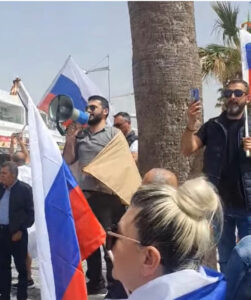
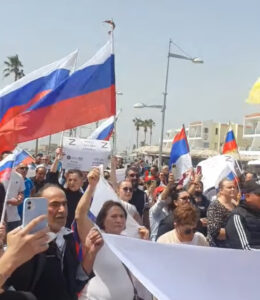
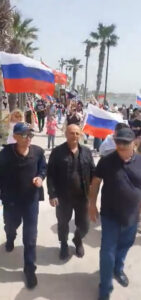
Photos of a rally in support of Russia and the war in Ukraine held in Paphos on April 3, 2022. Most of the participants are Pontious Greeks. The rally was organized by the Russian Embassy, the Russian Cultural Center, the Coordinating Council of Russian Compatriots and the Pontious Greeks Society of Cyprus.
The mass involvement of Pontious Greeks in these processes allows the GRU and other special services of the Russian Federation to create the appearance of broad support for Russian policy in Europe.The case of Vikenti Tsopozov sheds light on the methods and new tactics of Russian intelligence. We are following it and will keep our readers informed of developments.
Read more on the topic:
“Operation Party”
“Russian regiment” in Cyprus Goes to the Elections
Moscow’s Trojan Horse in the European Union
“Russian House” in Nicosia: an incubator of Russian spies in Cyprus

